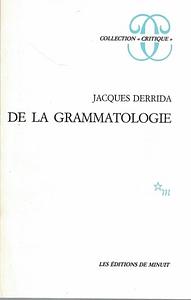Take a photo of a barcode or cover
adventurous
mysterious
tense
slow-paced
what the hell man. for everything mildly intelligible, derrida utters loads of near-incomprehensibility. and i dont even agree!
I had to read this for a critical theory course in graduate school. The impenetrable prose made me want to pull out my hair, and I'm pretty sure the emperor is naked in this case. I only made it through with the help of Harry Potter--a chapter of Derrida and three chapters of The Prisoner of Azkaban.
What a wonderful and always frustrating book - it really does have its moments but those moments are always compromised by Derrida's unwillingness to take on the first person and say what he wants to say. There's a methodological reason he won't do that, but it's a mistake, an ethical mistake of the first order.
Kept coming back to this when writing my paper on gender. He has a great quote about defining what “woman” is and the linguistic decisions behind it. Really useful to think of it because no matter what we still chase that definition. Who is woman, undefined, and isn’t her choice? - pretty much my paper premise but this made me think of it
slow-paced
I'm not going to be able to say anything particularly new or interesting about this, but these are the things that made an impression on me.
1. Language/Difficulty
The book's prose has a certain reputation - Derrida and Spivak? Quite the intimidating combination. And yes, some of the passages are lengthy, opaque, jargon-filled...
At times this seems reasonable enough; the concepts it's dealing with can be slippery and rely on turning things inside-out, having two opposing ideas inhere in each other simultaneously, etc. There's also its interest in lexical construction, wordplay, the resonances of particular words ("representation" is one example of a word that gets this treatment) which can result in circuitous phrasing.
At other times it does read like showing off or embodying a particular stylistic convention that was popular in theory works at the time. I certainly don't think the difficulty is always inevitable - whether it is justified in other ways might be another question.
I'd also say that whilst parts of it can be very wooly, that isn't true for every single part of the book. If someone was interested in it, they shouldn't feel too intimidated - they can probably still get something out of it.
In terms of my experience of reading it, two things: Firstly, I'd find myself frustrated with Derrida's way of explaining his ideas, but then suddenly there would be something so illuminating and interesting that I could almost forgive him. Secondly, I found that the dense language and topsy-turvy argument style of this kind of writing has always given me the feeling of falling into a big hole. I found it makes me think differently in a way that has as much to do with the disorientation brought on by the reading experience as the ideas themselves. I've found this to be exciting and valuable at times.
2. Concepts
Similarly to when I finally got around to reading Freud, we live with the legacy of these ideas already (albeit sometimes in a simplified/inaccurate form), so reading the arguments in the book occasionally felt more like remembering something than encountering something.
That said, some very important parts of the argument hadn't really been explained fully to me before in general introductions to poststructuralism. Reading the book in full did improve my understanding.
It vexes me a bit when people say that one of the book's arguments is that words are "meaningless". If anything words always have too much meaning, too widely spread out.
3. Years Ago, I Was Chinese
There are some odd takes on Chinese characters (and hieroglyphics, though I know less about them) from Derrida and the sources he quotes. There's no need to go into detail on the notion of "character fetishism" here, but it's interesting to read. Derrida's characterisation of how the Chinese writing system is invoked in the West as a "European hallucination" can be useful.
For more on this, there is an excellent article:
1. Language/Difficulty
The book's prose has a certain reputation - Derrida and Spivak? Quite the intimidating combination. And yes, some of the passages are lengthy, opaque, jargon-filled...
At times this seems reasonable enough; the concepts it's dealing with can be slippery and rely on turning things inside-out, having two opposing ideas inhere in each other simultaneously, etc. There's also its interest in lexical construction, wordplay, the resonances of particular words ("representation" is one example of a word that gets this treatment) which can result in circuitous phrasing.
At other times it does read like showing off or embodying a particular stylistic convention that was popular in theory works at the time. I certainly don't think the difficulty is always inevitable - whether it is justified in other ways might be another question.
I'd also say that whilst parts of it can be very wooly, that isn't true for every single part of the book. If someone was interested in it, they shouldn't feel too intimidated - they can probably still get something out of it.
In terms of my experience of reading it, two things: Firstly, I'd find myself frustrated with Derrida's way of explaining his ideas, but then suddenly there would be something so illuminating and interesting that I could almost forgive him. Secondly, I found that the dense language and topsy-turvy argument style of this kind of writing has always given me the feeling of falling into a big hole. I found it makes me think differently in a way that has as much to do with the disorientation brought on by the reading experience as the ideas themselves. I've found this to be exciting and valuable at times.
2. Concepts
Similarly to when I finally got around to reading Freud, we live with the legacy of these ideas already (albeit sometimes in a simplified/inaccurate form), so reading the arguments in the book occasionally felt more like remembering something than encountering something.
That said, some very important parts of the argument hadn't really been explained fully to me before in general introductions to poststructuralism. Reading the book in full did improve my understanding.
It vexes me a bit when people say that one of the book's arguments is that words are "meaningless". If anything words always have too much meaning, too widely spread out.
3. Years Ago, I Was Chinese
There are some odd takes on Chinese characters (and hieroglyphics, though I know less about them) from Derrida and the sources he quotes. There's no need to go into detail on the notion of "character fetishism" here, but it's interesting to read. Derrida's characterisation of how the Chinese writing system is invoked in the West as a "European hallucination" can be useful.
For more on this, there is an excellent article:
- 'Derrida's Chinese Prejudice', Sean Meighoo, Cultural Critique, no. 68, 2008 (https://www.jstor.org/stable/25475465).
I like it a lot and strongly recommend it - Meighoo covers the central debates (including some scholars' defensive response to critique of Derrida), and applies a deconstructive reading to Of Grammatology itself.
4. Do You Have to Read it?
Those who are curious may not feel the need to go through all the ins and outs of his reading of Rousseau, but for anyone with an interest in the humanities, it's no a bad thing to read at least some of it and see what it's all about straight from the source.
What you won't find is a clear "how to" guide to doing a deconstructive reading. Some of the central ideas of Derrida's work are also not fully articulated here and would need to be found in his other works.
Outside understanding the argument, I do also think it's worthwhile to at least experience the prose style and see how you react to it, even if you end up deciding that it's all bunk and affectation.
I studied under Jacques Derrida while working on a degree at that Deconstruction-loving university in Southern California. Meh. He smoked a pipe and had a stable of academics worshipping at the altar of The D.
As for this book... If you are a Deconstructionist then it's pretty much your bible. Enjoy. It's not for me.
As for this book... If you are a Deconstructionist then it's pretty much your bible. Enjoy. It's not for me.
The section on onanism is especially relevant for understanding the argument of this book
challenging
informative
slow-paced






